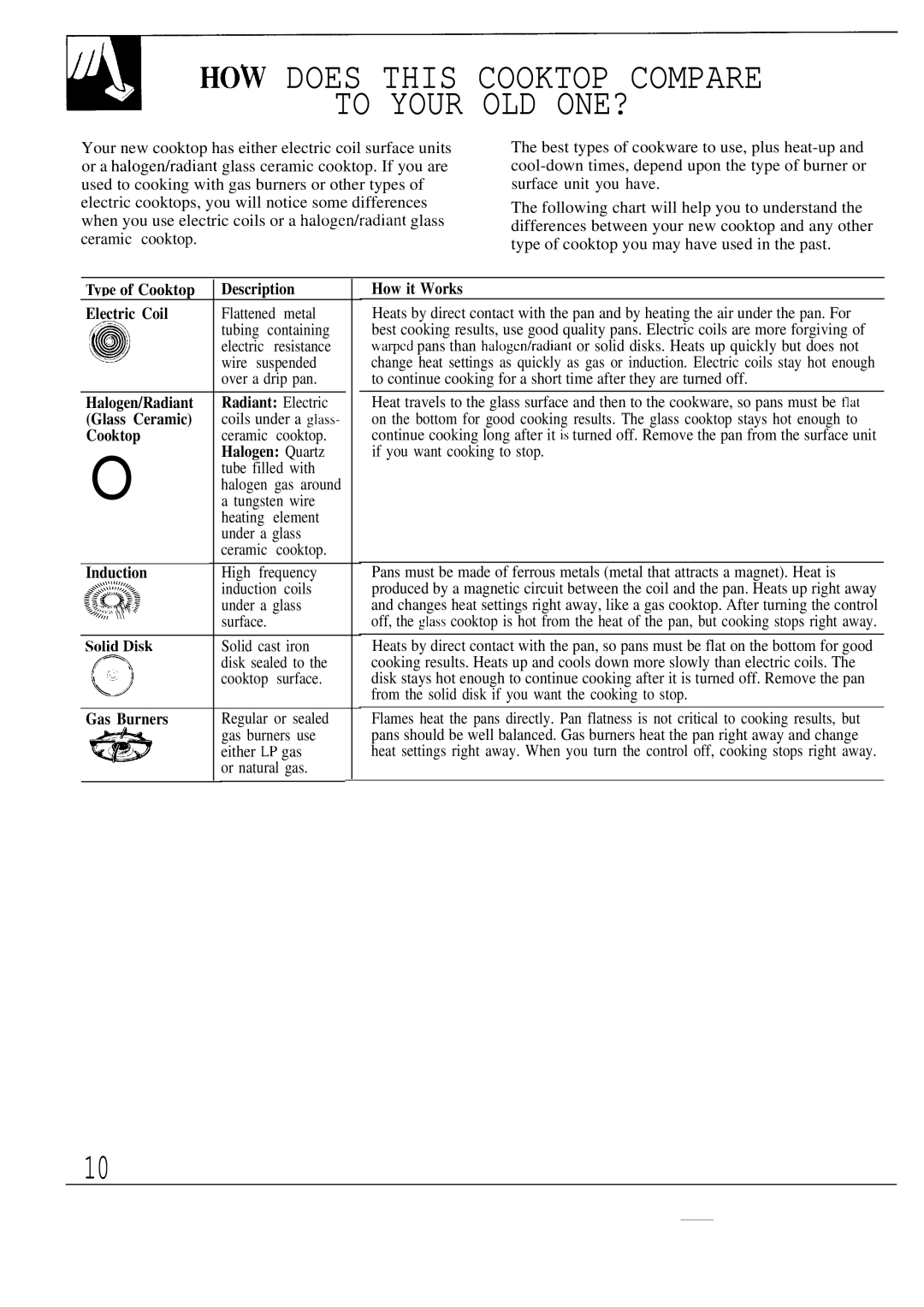
HOW DOES THIS COOKTOP COMPARE
TO YOUR OLD ONE?
Your new cooktop has either electric coil surface units or a halogenhadiant glass ceramic cooktop. If you are used to cooking with gas burners or other types of electric cooktops, you will notice some differences when you use electric coils or a halogenhadiant glass ceramic cooktop.
The best types of cookware to use, plus
The following chart will help you to understand the differences between your new cooktop and any other type of cooktop you may have used in the past.
Twe of Cooktop |
| Description |
| |||||
Electric Coil |
| Flattened metal |
| |||||
,, |
|
|
| tubing | containing |
|
| |
7 |
|
|
| |||||
|
| electric | resistance |
|
| |||
:) |
|
|
| |||||
@ |
|
| wire suspended |
|
| |||
9 |
|
|
| |||||
|
|
|
| over a drip pan. |
| |||
|
|
|
|
|
|
| ||
Halogen/Radiant |
| Radiant: Electric |
|
|
| |||
(Glass Ceramic) |
| coils under a glass- |
| |||||
Cooktop |
| ceramic | cooktop. |
| ||||
o |
| Halogen: Quartz |
| |||||
| tube filled with |
| ||||||
| halogen gas around |
| ||||||
| a tungsten wire |
| ||||||
|
|
|
| heating | element |
| ||
|
|
|
| under a glass |
| |||
|
|
|
| ceramic | cooktop. |
| ||
|
|
|
|
|
|
| ||
Induction |
|
| High frequency |
|
| |||
\\\\\lll~J//,/ |
| induction coils |
|
| ||||
.=.- |
|
|
| |||||
,111,/,, | /,, |
|
|
|
|
|
|
|
%~s,,,,,,,gg: |
| under a glass |
|
| ||||
\\\ ,..- |
|
|
| |||||
==,’+/,, ,,, \\\ |
|
|
|
|
|
| ||
“%/,,l, \\\ |
|
|
| surface. |
|
|
|
|
|
|
|
|
|
|
|
| |
|
|
|
|
|
|
|
| |
|
|
|
| Solid cast iron |
| |||
|
|
|
| disk sealed to the |
| |||
|
|
|
| cooktop surface. |
| |||
|
|
|
|
| ||||
Gas Burners |
| Regular or sealed |
|
| ||||
|
|
|
| gas burners use |
| |||
|
|
|
| either LP gas |
| |||
|
|
|
| or natural gas. |
| |||
|
|
|
|
|
|
|
|
|
How it Works
Heats by direct contact with the pan and by heating the air under the pan. For best cooking results, use good quality pans. Electric coils are more forgiving of warped pans than
Heat travels to the glass surface and then to the cookware, so pans must be flat on the bottom for good cooking results. The glass cooktop stays hot enough to continue cooking long after it is turned off. Remove the pan from the surface unit if you want cooking to stop.
Pans must be made of ferrous metals (metal that attracts a magnet). Heat is produced by a magnetic circuit between the coil and the pan. Heats up right away and changes heat settings right away, like a gas cooktop. After turning the control off, the glass cooktop is hot from the heat of the pan, but cooking stops right away.
Heats by direct contact with the pan, so pans must be flat on the bottom for good cooking results. Heats up and cools down more slowly than electric coils. The disk stays hot enough to continue cooking after it is turned off. Remove the pan from the solid disk if you want the cooking to stop.
Flames heat the pans directly. Pan flatness is not critical to cooking results, but pans should be well balanced. Gas burners heat the pan right away and change heat settings right away. When you turn the control off, cooking stops right away.
10
